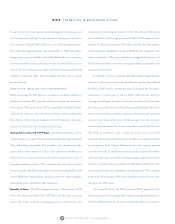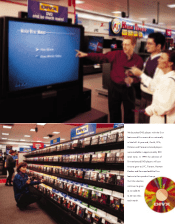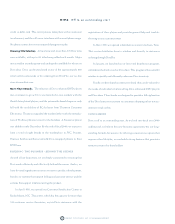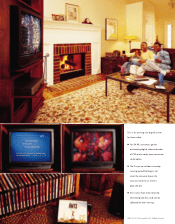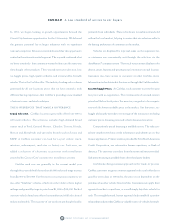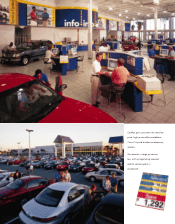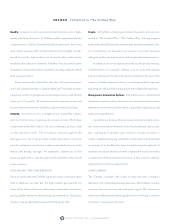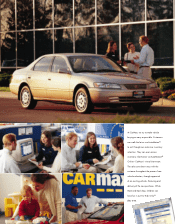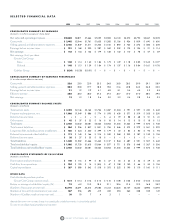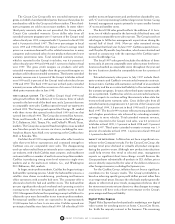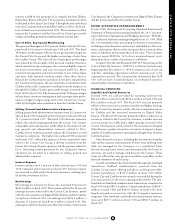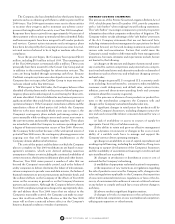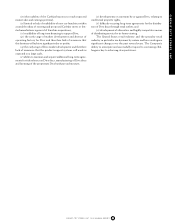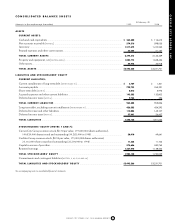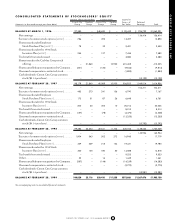CarMax 1999 Annual Report Download - page 26
Download and view the complete annual report
Please find page 26 of the 1999 CarMax annual report below. You can navigate through the pages in the report by either clicking on the pages listed below, or by using the keyword search tool below to find specific information within the annual report.
The Circuit City Group sells two extended warranty pro-
grams on behalf of unrelated third parties that issue these plans for
merchandise sold by the Group and other retailers. These third-
party programs are sold in most major markets. In states where
third-party warranty sales are not permitted, the Group sells a
Circuit City extended warranty. Gross dollar sales from all
extended warranty programs were 5.4 percent of the Group’s total
sales in fiscal year 1999, compared with 5.5 percent in fiscal 1998
and 6.0 percent in fiscal 1997. The lower percentages in fiscal
years 1999 and 1998 reflect the impact of lower average retail
prices on consumer demand for the related warranties in many
categories and increased sales of some products that carry lower
warranty penetration rates. Total extended warranty revenue,
which is reported in the Group’s total sales, was 4.6 percent of
sales in fiscal years 1999 and 1998 and 5.1 percent of sales in fiscal
year 1997. The gross profit margins on products sold with
extended warranties are higher than the gross profit margins on
products sold without extended warranties. Third-party extended
warranty revenue was 4.1 percent of the Group’s total sales in fiscal
year 1999 and 3.6 percent of the Group’s total sales in fiscal years
1998 and 1997. The fiscal 1999 increase in third-party extended
warranty revenue reflects the conversion of stores in 10 states to
third-party warranty sales in June 1998.
THE CARMAX GROUP.
The CarMax Group’s fiscal 1999 total
sales growth reflects the addition of 12 locations, three of which
opened in the last week of the fiscal year, and a 2 percent decrease
in comparable store sales. CarMax opened 10 used-car superstores
in fiscal 1999. The Group grand-opened the Chicago, Ill., market
with three stores that opened early in fiscal 1999 and one that
opened late in fiscal 1998. The Group also entered San Antonio,
Texas; and Greenville, S.C.; and added stores in the Washington,
D.C./Baltimore, Md.; Tampa, Fla.; and Dallas/Ft. Worth, Texas,
markets. The Group also acquired franchise rights or was awarded
new franchise points for six new-car stores, including the nine-
franchise Mauro Auto Mall, now operating as the CarMax Auto
Mall, in Kenosha, Wis.
CarMax’s fiscal 1999 comparable store sales reflect used-car
sales that were below expectations and continued strength in
CarMax’s new-car comparable store sales. The disappointing
used-car sales resulted from an intensely price-competitive new-
car industry, with which CarMax must compete, and insufficient
customer traffic in a number of multi-store metropolitan markets.
CarMax is producing strong store-level returns in single-store
markets and in the multi-store Atlanta, Ga., and Washington
D.C./Baltimore, Md., markets.
In larger, metropolitan markets, CarMax has begun testing a
hub/satellite operating process. Under the hub/satellite process, a
satellite store shares reconditioning, purchasing and business
office operations with a nearby hub store. The consumer offer is
identical in both the hub and satellite stores. The hub/satellite
process significantly reduced overhead and operating costs for
existing stores that were designated as satellite stores in fiscal
1999. Management believes this operating concept will allow it to
efficiently open more but smaller stores in metropolitan markets.
Prototypical satellite stores are expected to be approximately
12,000 square feet on four- to six-acre sites. CarMax opened one
prototypical satellite store late in fiscal 1999. All other fiscal 1999
satellite stores are larger stores and are therefore classified by size,
with “C” stores representing CarMax’s largest store format. Going
forward, management expects primarily to open smaller format
“A” stores and satellite stores.
The fiscal 1998 sales growth reflects the addition of 11 loca-
tions, two of which opened in the last week of the fiscal year, and
a 6 percent comparable store sales increase. The Group’s used-car
sales began to fall below management’s expectations during the
second half of fiscal 1998. New-car sales remained strong
throughout that fiscal year. In June 1997, CarMax acquired its sec-
ond Chrysler-Plymouth-Jeep franchise, which was relocated and
opened in conjunction with the opening of the CarMax super-
store in Stockbridge, Ga.
The fiscal 1997 sales growth includes the addition of three
stores and a 23 percent comparable store sales increase for the two
locations classified as comparable stores throughout the year and
the two locations classified as comparable stores for a portion of
the year.
Extended warranty sales prior to July 1997 include third-
party contracts and CarMax’s own extended warranty contracts.
In most states, CarMax sells warranties on behalf of an unrelated
third party and has no contractual liability to the customer under
the warranty programs. In states where third-party warranty sales
are not permitted, CarMax has sold its own extended warranty.
CarMax expects to continue selling this warranty where state law
restricts third-party warranty sales. Gross dollar sales from all
extended warranty programs were 4.3 percent of the Group’s total
sales in fiscal 1999, 3.8 percent in fiscal 1998 and 3.5 percent in
fiscal 1997. The fiscal 1999 increase reflects pricing adjustments
and a higher penetration rate achieved by extending warranty
coverage to more vehicles. Total extended warranty revenue,
which is reported in the Group’s total sales, was 2.0 percent of
total sales in fiscal 1999, 1.5 percent in fiscal 1998 and 1.2 percent
in fiscal 1997. Third-party extended warranty revenue was 1.9
percent of total sales in fiscal 1999, 1.4 percent in fiscal 1998 and
1.1 percent in fiscal 1997.
IMPACT OF INFLATION.
Inflation has not been a significant con-
tributor to the Company’s results. For the Circuit City Group, the
average retail price declined in virtually all product categories
during the past two years. Although new product introductions
could help reverse this trend in selected areas, management
expects no significant short-term change overall. Because the
Group purchases substantially all products in U.S. dollars, prices
are not directly impacted by the value of the dollar in relation to
other foreign currencies, including the Japanese yen.
For the CarMax Group, inflation has not been a significant
contributor to the Group’s results. The Group’s profitability is
based on achieving specific gross profit dollars per unit rather than
on average retail prices. Because the wholesale market generally
adjusts to reflect retail price trends, management believes that if
the stores meet inventory turn objectives, then changes in average
retail prices will have only a short-term impact on the Group’s
gross margin and thus profitability.
Digital Video Express
Digital Video Express has developed and is marketing a new digital
video system for watching movies at home. Circuit City Stores,
Inc. holds the majority interest in the business. The remaining
24 CIRCUIT CITY STORES, INC. 1999 ANNUAL REPORT


